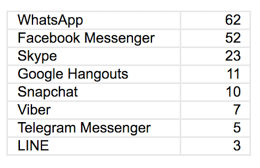A judge in Brazil has ordered cell phone carriers to block access to the calling and texting service WhatsApp for 48 hours beginning early Thursday morning, after the company reportedly failed to respond to a court order in a drug-trafficking case earlier this year. Later in the day, the Sao Paolo high court ruled that service should be restored after just 12 hours of outage, citing "constitutional principles" and the services "millions of affected users."
WhatsApp, which was acquired by Facebook for $22 billion last year, was the most downloaded app last year in Brazil, the world's fourth-largest smartphone market. Many poorer Brazilians depend exclusively on the service for their day-to-day communications; in total, the service has more than 100 million users in Brazil, according to a post by Facebook CEO Mark Zuckerberg earlier today.
"I am stunned that our efforts to protect people's data would result in such an extreme decision by a single judge to punish every person in Brazil who uses WhatsApp," Zuckerberg wrote. He called it a "sad day for Brazil."
Still, Brazilian phone companies who've seen WhatsApp's Internet-based talk-and-text service cut into their revenue may be only too happy to comply with the order. Amos Genish, the president of leading Brazilian phone company Vivo, denounced the wildly popular talk-and-text app as "pure piracy" earlier this year.
WhatsApp recently introduced a free calling service, which works on users' data plans but is far cheaper than carrier-based voice calling. The service's popularity has actually contributed to a reduction in the number of active mobile lines in Brazil, according to the English-language Rio Times. It's enabled Brazilian users to switch from juggling multiple SIM cards from multiple carriers in search of the best calling deals to simply using cheaper data plans for talking and texting.

Rival encrypted-messaging app Telegram reports more than 1.5 million Brazilian users have signed up for its service since WhatsApp has been blocked.
"1.500.000 and counting, SMS-Gateways overloading," the company tweeted, referring to the computers it uses to text activation codes to new customers. "Hang on, your codes are coming! We've got all hands on deck to accommodate the crazy load."
It's estimated that 62% of Brazilian Internet users aged between 16 and 64 use WhatsApp each month, according to GlobalWebIndex. WhatsApp is considered the world's most popular messaging service, with more than 900 million active users globally.
Zuckerberg's statement, posted to Facebook in English and Portuguese, said Facebook Messenger is still available in Brazil.
The service began encrypting messages sent between its users in November last year, making it impossible for third parties including hackers and governments to access them. The details of the underlying court case, said to be a drug-trafficking related case in São Paulo state, are under seal.
"This is really shocking, and illegal," Ronaldo Lemos, the director of the Institute for Technology and Society of Rio de Janeiro, told the Wall Street Journal. "What puzzles me is that one single court can exercise that kind of power, and that the telecommunications companies didn't fight against it. It shows how fragile the Brazilian Internet is."
The decision appears to be an about-face after Marco Civil, a groundbreaking Internet "Bill of Rights" approved last year by President Dilma Rousseff, as a response to the Snowden revelations that the NSA was spying on Brazil. The landmark bill, Brazil's first Internet legislation, was intended to protect net neutrality, privacy, and freedom of speech.